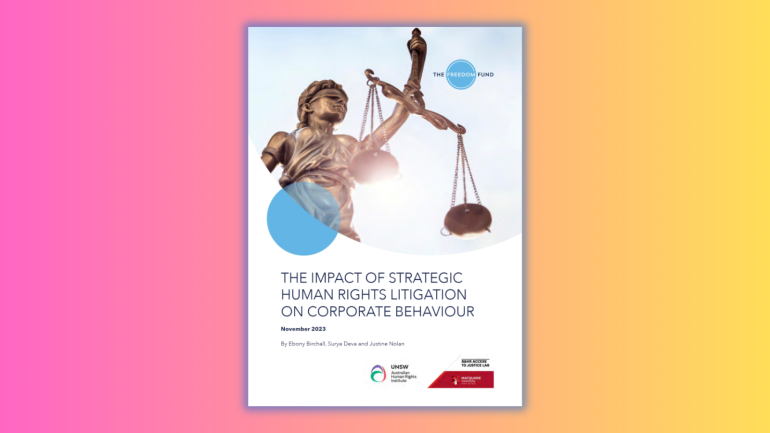Why are we doing this research?
Strategic human rights litigation has been a key strategy employed in the business and human rights field to bring a change in corporate behaviour. It involves lawsuits being filed with a larger ambition to promote societal and legal change. These lawsuits are often brought in conjunction with, or support from, civil society organisations and are part of a broader campaign to address corporate human rights abuses and promote corporate accountability.
Human rights litigation has been active against corporations since at least the early 1980s. Early cases against Union Carbide Corporation for the Bhopal Indian gas disaster and Unocal for its alleged abuses in Myanmar provide early examples of such litigation. But how effective has this strategy been? What are the potential risks of litigation and how can these risks be managed? Under what circumstances has litigation achieved positive changes in corporate behaviour?
The report finds that litigation has been used successfully to promote human rights and shape corporate behaviour. The systemic impact on corporate behaviour has, however, been slow and patchy. The report proposes an original Impact Framework to assess impacts in a holistic and systemic way. The report also identifies six key strategies and variables to maximise the impact of litigation on corporate behaviour. These are: (i) selecting the ‘right case’ (taking into account variables including the public profile and culture of the company, suitability of the forum and access to credible evidence); (ii) evaluating and managing negative risks of litigation; (iii) collaborating with reliable local partners; (iv) managing expectations and competing goals; (v) employing complementary redress mechanisms; and (vi) securing sustainable funding.
This research is significant both in terms of its focus and timing. Although to date, there has been some anecdotal evidence and isolated case studies, research focusing on a holistic assessment of the impacts of strategic litigation on corporate behaviour is limited. This gap in the existing literature is unsurprising given various challenges in making such an assessment: difficulties in making causal connections, disparate views about the impacts of litigation amongst the affected rightsholders and communities, and corporations hesitating to admit and disclose how litigation influenced their business decisions due to confidentiality or competitiveness reasons. This report seeks to fill this gap.
Publications
Video
How is this project funded?
This report is supported by funding from The Freedom Fund.
Research team
- Professor Justine Nolan, Australian Human Rights Institute, UNSW Sydney
- Professor Surya Deva, Macquarie University
- Dr Ebony Birchall, Macquarie University
- Samuel Pryde, Australian Human Rights Institute, UNSW Sydney

